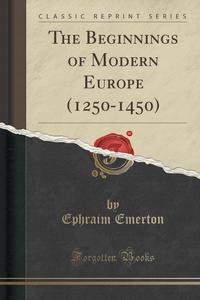Excerpt from The Beginnings of Modern Europe (1250-1450)
The period of which this volume treats differs fundamentally both from that which precedes and from that which follows it. In each of those periods we are able to fix our attention upon a certain well-defined set of institutions which completely control its activities In the former, the strictly mediaeval, we see Europe wholly under the sway of two vast ideas, feudalism and the Roman church system. In the latter, the purely modern period, Europe has almost wholly lost those ideas and has come out into the familiar political structure of a family of independent national states and into the freer air of religious toleration, if not yet of religious liberty.
Between these two lies the period which is the subject of our present study. It is a chapter in human history of which no brief general description can be given. It is impossible to point to any peculiar institutions that govern its life. As we try to unfold the tangled thread of its history we seem to find only confusion and disorder. It reminds one in many ways of that other and even greater confusion that lies between the records of Rome and those of the Germanic Middle Ages. There we are conscious of a mighty civilization passing away and of another just vaguely taking shape in rude barbaric forms which, however, contain the germs of a new and more vigorous life. So here again we find two opposing currents in the stream of human history, and already at the beginning of our study it is clear which of them is destined to prevail. The vast, picturesque structure of the Middle Ages has done its service and is beginning to crumble. In every direction the resistless forces of the modem world are undermining its foundations or with bolder front are beating in open assault against its walls.
About the Publisher
Forgotten Books publishes hundreds of thousands of rare and classic books. Find more at www.forgottenbooks.com
This book is a reproduction of an important historical work. Forgotten Books uses state-of-the-art technology to digitally reconstruct the work, preserving the original format whilst repairing imperfections present in the aged copy. In rare cases, an imperfection in the original, such as a blemish or missing page, may be replicated in our edition. We do, however, repair the vast majority of imperfections successfully; any imperfections that remain are intentionally left to preserve the state of such historical works. Это и многое другое вы найдете в книге The Beginnings of Modern Europe (1250-1450) (Classic Reprint) (Ephraim Emerton)
